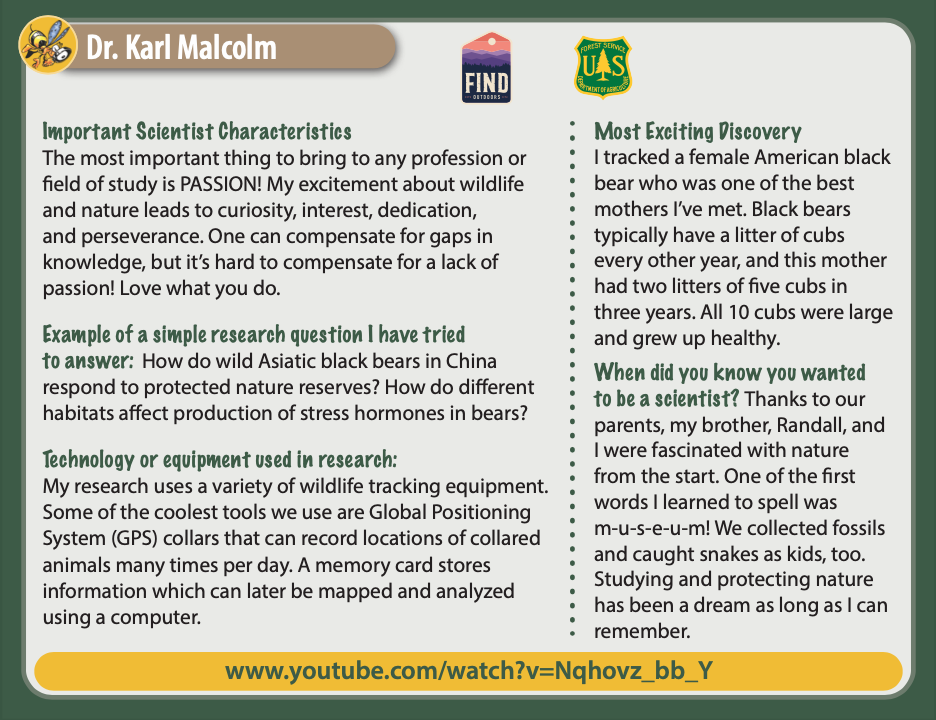Wilderness
Learn more about wilderness benefits, wilderness protection and preservation, wilderness recreation, and more with a variety of Natural Inquirer resources. Browse by topic, grade band, and resource type.
-

 Forests & PlantsWildlife
Forests & PlantsWildlifeKevin McKelvey, Ecologist

- University of Florida
- USDA Forest Service Scientist
- Ecology is the study of interactions between organisms and their environment. I primarily study animals.
- University of Florida
- USDA Forest Service Scientist
- Ecology is the study of interactions between organisms and their environment. I primarily study animals.
-

 Forests & PlantsWildlife
Forests & PlantsWildlifeSteve Matthews, Wildlife Landscape Ecologist

- Ph.D., Ohio State University
- USDA Forest Service Scientist
- A landscape ecologist studies how different land uses influence and shape ecological communities. I am particularly interested in how birds and forests respond to a changing environment.
- Ph.D., Ohio State University
- USDA Forest Service Scientist
- A landscape ecologist studies how different land uses influence and shape ecological communities. I am particularly interested in how birds and forests respond to a changing environment.
-

 Wildlife
WildlifeBruce G. Marcot, Research Wildlife Ecologist

- Ph.D., Oregon State University Corvallis OR
- USDA Forest Service Scientist
- I study the reasons why plant and animal species are rare, why some are at risk, and how threatened or endangered species and ecosystem functions can be conserved and restored.
- Ph.D., Oregon State University Corvallis OR
- USDA Forest Service Scientist
- I study the reasons why plant and animal species are rare, why some are at risk, and how threatened or endangered species and ecosystem functions can be conserved and restored.
-

 Wildlife
WildlifeKarl Malcolm, Wildlife Ecologist

- Ph.D., University of Wisconsin-Madison
- USDA Forest Service Scientist
- A wildlife ecologist studies the relationships and interactions among wildlife, their habitats, landscapes, ecosystems, and people.
- Ph.D., University of Wisconsin-Madison
- USDA Forest Service Scientist
- A wildlife ecologist studies the relationships and interactions among wildlife, their habitats, landscapes, ecosystems, and people.
-

 Forests & PlantsWildlife
Forests & PlantsWildlifeSusan Loeb, Conservation Biologist

- Ph.D., University of California, Davis
- USDA Forest Service Scientist
- Conservation ecology is the study of plants and animals in their natural and human-impacted environments to determine what they need to maintain healthy populations.
- Ph.D., University of California, Davis
- USDA Forest Service Scientist
- Conservation ecology is the study of plants and animals in their natural and human-impacted environments to determine what they need to maintain healthy populations.
-

 Forests & PlantsWildlife
Forests & PlantsWildlifeChristina Liang, Ecologist

- Ph.D., University of California-Davis
- USDA Forest Service Scientist
- An ecologist studies the interactions between living things and their environment. The environment includes the physical environment such as climate, water, and soil as well as biological environment such as other living things.
- Ph.D., University of California-Davis
- USDA Forest Service Scientist
- An ecologist studies the interactions between living things and their environment. The environment includes the physical environment such as climate, water, and soil as well as biological environment such as other living things.
-

 Forests & PlantsWildlife
Forests & PlantsWildlifeSusannah Lerman, Research Ecologist

- Ph.D., University of Massachusetts
- USDA Forest Service Scientist
- As an urban wildlife ecologist, I study how animals in cities interact with their habitat and how people interact with their local wildlife.
- Ph.D., University of Massachusetts
- USDA Forest Service Scientist
- As an urban wildlife ecologist, I study how animals in cities interact with their habitat and how people interact with their local wildlife.
-

 Forests & PlantsWildlife
Forests & PlantsWildlifeSerra J. Hoagland, Biological Scientist

- Ph.D., (student) Northern Arizona University
- USDA Forest Service Scientist
- Biological scientists study many different types of organisms from endangered birds to large predators. We study wildlife populations and their habitat to help conserve them for future generations!
- Ph.D., (student) Northern Arizona University
- USDA Forest Service Scientist
- Biological scientists study many different types of organisms from endangered birds to large predators. We study wildlife populations and their habitat to help conserve them for future generations!
-

 Forests & PlantsWildlife
Forests & PlantsWildlifeEileen H. Helmer, Ecologist

- Ph.D., Oregon State University
- USDA Forest Service Scientist
- Ecologists help study the relationships among organisms and between organisms and their environment.
- Ph.D., Oregon State University
- USDA Forest Service Scientist
- Ecologists help study the relationships among organisms and between organisms and their environment.
-

 Forests & PlantsWildlife
Forests & PlantsWildlifeWilliam Gould, Ecologist

- Ph.D., University of Colorado, Boulder
- USDA Forest Service Scientist
- An ecologist studies the relationships between living organisms and the environments they live in.
- Ph.D., University of Colorado, Boulder
- USDA Forest Service Scientist
- An ecologist studies the relationships between living organisms and the environments they live in.



